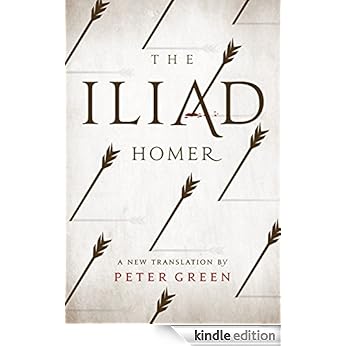I came across a book review of a new translation of
Homer’s The Iliad by Peter Green in Washington
Free Beacon.
When it comes to picking
a translation of the Iliad or the Odyssey, readers of Homer sometimes feel as
if they are being forced to choose between the beautiful and the good. The most
popular translations of Homer are either praised for their poetry or for their
accuracy, but not for both.
Robert Fitzgerald and
Robert Fagles’ translations are known for their lovely verses, but also for
taking liberties with the text. Meanwhile, Richard Lattimore’s translation is
known for being line-by-line accurate to the Greek, but also for being
convoluted and difficult to read. However, his fidelity to the text makes him
the standard translation for purists.
Now that is an interesting observation on the various
translations around. I have read both
the Robert Fitzgerald and Robert Fagles translations and think highly of
them. Now I can’t read the original
Greek, so I can’t speak to their accuracy.
I have not read the Richard Lattimore translation but I have heard of it
and I did not realize it was closer to the original translation. Kate havard at the Free Beacon goes on:
In his new version of the
Iliad, Peter Green, a professor emeritus of classics at the University of Texas
at Austin, attempts to give us a translation that is as faithful to the Greek
as the Lattimore while being easier to read, and, more important, easier to
hear. Green believes that a poem “so oral in its essence … should be naturally
declaimable.”
Because Green’s Iliad is
written to be read aloud, the language is much simpler and less lofty than the
Lattimore. Yet like Lattimore, Green insists on “preserving the strangeness” of
Homer, the aspects of his poetry that strike the modern ear so oddly—the
repeated formulaic phrases, the consistent use of epithets (Achilles is always
“swift-footed,” even when he is merely sitting around) and the long, long,
similes.
To my recollection both Fitzgerald and Fagles’
translayions keep Homer’s long winding epithets and similes. So it’s hard to say what the distinction she
is making with the Lattimore translation.
She goes on, however, to point out that the Green translation goes even
further than the Lattimore’s close translation:
The virtue in Green’s
translation comes from its meter. Homer’s poetry is written in dactylic
hexameter, six sets of dactyls, a poetic foot consisting of one long sound and
two shorts. It sounds something like this: DAH-didi DAH-didi DAH-didi DAH-didi
DAH-didi DAH-didi (the dactyl can also consist of two longs, a DAH-DAH). It beats
forward, like the drummer keeping time for rowers on a galley ship.
This meter is very
difficult to render into English: Greek poetry relies on vowel lengths, but in
English, vowel sounds have no fixed quantity. For this reason, Fitzgerald and
Fagles abandon the hexameter.
But throwing out Homer’s
meter, Green says, robs the reader of Homer’s stately and majestic rhythms,
which contribute greatly to his momentum and power. However, he adds that when
a strict dactylic hexamter is rendered into English, it results in over-long
lines that drag lugubriously.
Wow, so Green uses Homer’s dactylic hexameter in
English. Yes, a volume as long as The
Iliad would drag the reader down over such a span. I couldn’t imagine enjoying that read. And neither could Green:
Green’s solution is to
use a loose approximation of Homer’s meter (“a variable 6/5 stress line ranging
from 12 to 17 syllables”). This meter echoes the Homeric meter without trying
too hard to force the English language to take on unnatural, ancient
characteristics. Green’s approach results in passages that are deceptively
simple and highly musical.
For example, in this
passage, Homer describes Achilles’ inability to sleep due to the grief he
suffers from losing his dear friend Patroklus to his great enemy, Hektor. The
last line is particularly lovely:
…sleep the all subduing
got no hold on him: he
kept tossing this way and that
missing Patroklus—his
manhood, his splendid strength,
all he’d been through with
him, the hardships he’d suffered,
facing men in battle and
the waves of the cruel sea.
The pace of this passage
seems to build and build until Achilles can no longer contain his heartache:
Recalling these things he
shed large tears, lying now,
Stretched out on his
side, but, restless, sometimes again
on his back, or prone.
Then again he’d rise to his feet
and wander, distraught,
by the seashore…
The description is
uncomplicated but the movement here is rapid, and the pacing is as restless and
as agitated as Achilles. The symmetry in the line “stretched out on his side,
restless, sometimes again,” coveys something of the obsessive, circular thoughts
and shifting around that define a sleepless night.
Fascinating. I
do like the metric solution that Green employs in that passage. There are more examples at the Free Beacon
article. It’s a translation that’s worth
considering, though I already have two translations.



Ha, Now you're beginning to sound like the other Victor. I wonder what's happened to him. Always a pleasure to get your humor Victor.
ReplyDelete